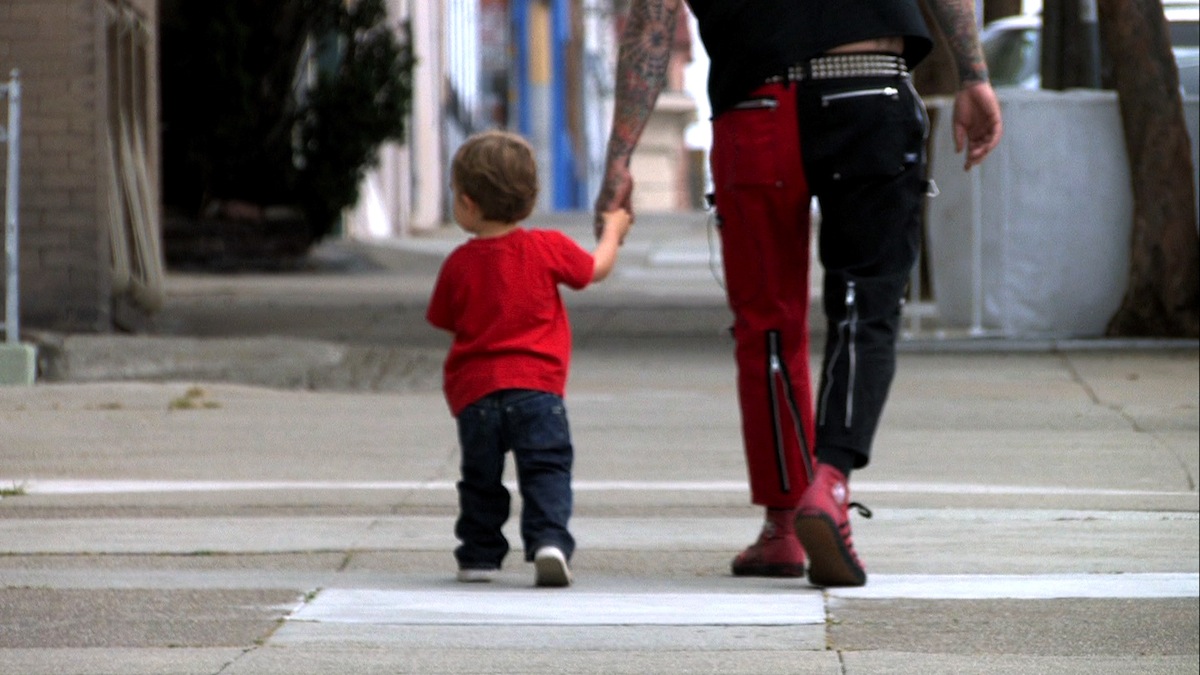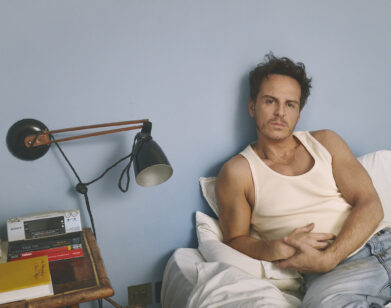Andrea Nevins’ Punk Papas

ABOVE: A STILL FROM THE OTHER F WORD OF RANCID’S LARS FREDERIKSEN AND HIS SON, COURTESY OF OSCILLOSCOPE LABORATORIES
Shortly after “I Was a Teenage Anarchist” opens the new documentary The Other F Word, Jim Lindberg, the 46-year-old lead singer of the punk band Pennywise, gives the cameras a glimpse into his road shaving kit: antacids (“super-important because you eat like shit”), hand sanitizer, hair dye (“to keep the dream alive”), nose-hair trimmers (“for hair growing in weird places”) and hats (“to hide the receding hairline”).
The unintentionally hilarious juxtaposition of hardcore punk and the family lives of its aging frontmen gives The Other F Word its comic punch. The incongruity of heavily-tatted rockers driving minivans as they sing “the wheels on the train go round and round” to toddlers in carseats, struggle to justify dominatrix tattoos to preschoolers, explain why they can’t get butterfly tattoos or pack Barbie dolls in their road gear, all permeate the film, which explores how a group of LA punk rockers navigated the path from “fuck you” to fatherhood.
With rare archival footage, director Andrea Blaugrund Nevins provides an extraordinary chronicle of the origins of the violent LA punk scene which originated in Hermosa Beach in the late ’70s. Two of its seminal bands, Black Flag and Circle Jerks, appeared in Penelope Spheeris’s 1981 cult doc, The Decline of Western Civilization, along with the highly influential LA band, X. Cristan Reilly, the producer of The Other F Word, befriended Lindberg, her high school classmate, when they were both teens who got onto Dick Clark’s American Bandstand in order to see X. “Jimmy only came on because X was going to play,” Reilly said. “He went backstage and crashed into [Exene Cervenka’s] dressing room and she was so great to him; he was just a 17, 18-year-old kid and already very much a rocker.”
Reilly described Hermosa Beach of the early ’80s as “a very violent scene; the fury, the bikers, so hardcore. Guys would come back from a Black Flag or TSOL show, all beaten up. LA seemed to be a sunny happy place, but underneath that, there was a lot of angry, scary stuff going on and these were the guys who were going to voice it and act it out.”
After nearly twenty years of fronting Pennywise, Lindberg wrote his memoir, Punk Rock Dad: No Rules, Just Real Life. Reilly gave it to her friend, Nevins, to read. Nevins, a native New Yorker whose musical taste included Patti Smith, The Ramones and B-52s, had moved to LA. “Our husbands work together in television,” said Nevins. “I was a fish out of water, who had moved from NY to LA to be with my now-husband, and I met Cristan in the first week. And I just got her. A lot of other Californians, I didn’t really get.” Reilly agreed: “The film was only going to happen if Andrea was interested. I wasn’t interested in going to anyone else because of our similar, ironic sense of humor.”
Both are mothers of three children. Nevins said, “I had taken ten years off before Cristan brought this book to me, and one of the things that appealed to me is that it described what I had gone through in making the transition from being a career person and a filmmaker to being a full-time mom and trying to then go back again. We felt obliged to give all the variables that we go through at mid-life to figure out where you are, how to live good life and be a good parent.”
Even though Lindbergh’s book was the jumping-off point for the documentary, he was, said Reilly, “a very reluctant documentary subject. He was happy to participate, but he was not comfortable with being the sole story. He is our ‘gateway drug to punk’ because he takes you in there. It’s why we ended up going to different people, because he would just deflect private time with his kids… so we had to look elsewhere. He’d say, ‘If you think I’m punk, go talk to Fat Mike; he’s really punk.’ And Fat Mike would say, ‘If you think I’m punk, you should go talk to Lars.’ That’s how the story just got more and more rich.”
The film follows Lindberg on a world-wide tour, a grueling marathon grind of some 236 days, which is interspersed with interviews from a who’s who of punk: Flea of Red Hot Chili Peppers, Mark Hoppus of Blink-182, Mark Mothersbaugh of Devo, Tim McIlrath of Rise Against, Art Alexakis of Everclear, Fat Mike of NOFX, Lars Frederiksen of Rancid, pro skater Tony Hawk, and Ron Reyes of Black Flag.
Ron Reyes, said Reilly, “was the Greta Garbo of punk; nobody had heard from him in 20 years. He works in a printing job in Vancouver; he’s a good provider, there with his kids, still married to the same woman. He started performing again in the last year; I think this movie brought it out of him. He was with us in SXSW, that was really a treat. He turned 50 his year and had not been back in the US since he left.” SXSW is where another groundbreaking 80s-era rocker—Beastie Boy and filmmaker Adam Yauch—saw The Other F Word and picked it up for release from his film company, Oscilloscope Laboratories.
As consistently funny and highly entertaining as The Other F Word is, the film has the depth and substance of a serious documentary, as it takes on sociological issues far beyond the realm of punk parenting. Nevins, a Harvard grad whose background in journalism includes The New York Times, NPR, NBC, and ABC News, earned an Academy Award nomination for her documentary short, Still Kicking. It would not be surprising if the Academy similarly recognized The Other F Word, her feature-length directorial debut, which explores such issues as aging (finding a way to put food on the table while working in a creative field), the state of the music industry (the necessity of constant touring as record stores disappeared and conglomerates swallowed indie labels), the choice for parents between family and career, and the redefinition of modern fatherhood.
Most of the musicians came from similar backgrounds; many ran away from home as young teens and their fathers either abandoned the family or were absent. Although punks were widely perceived by society as knuckleheads, these rockers are sensitive, thoughtful, moving, and frequently profound in their desire to not repeat their own fathers’ mistakes.
Reilly was most surprised by “the tenderness” of the musicians. “Jimmy’s just pure funny, and the other guys, I was expecting to have that same wry, slightly distant take on the world,” explained Nevins. “But instead, when I asked them about any aspect of fatherhood, their own fathers or their children, they became unbelievably emotional. Every one of them. I think the reason they had to create the extra hard, extra-spiky [persona] was because as teenagers they were that much softer, more poetic and aware of their surroundings. Most were very smart and very literate. The spikes were created to keep people away and only allow access people of a like tribe.”
THE OTHER F WORD IS OUT NOW.






